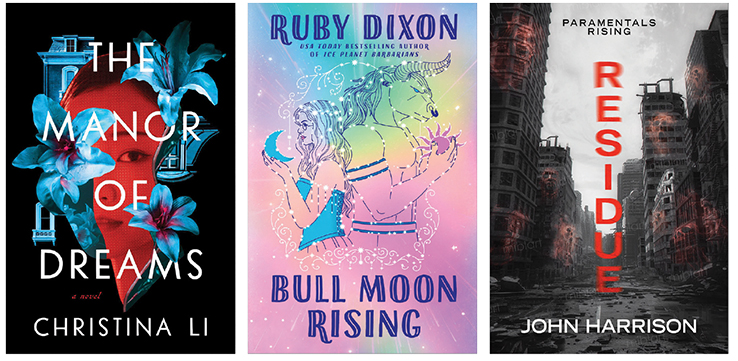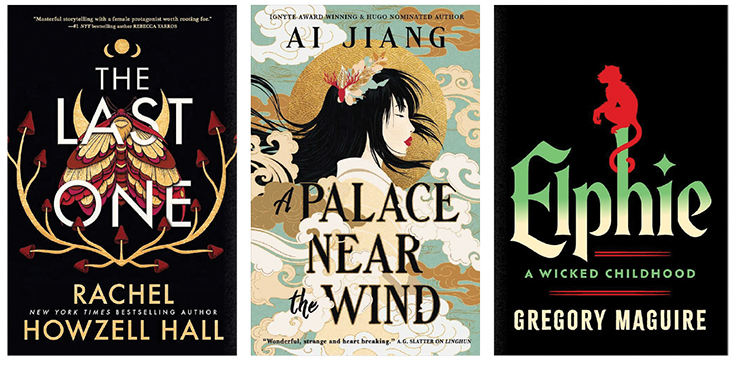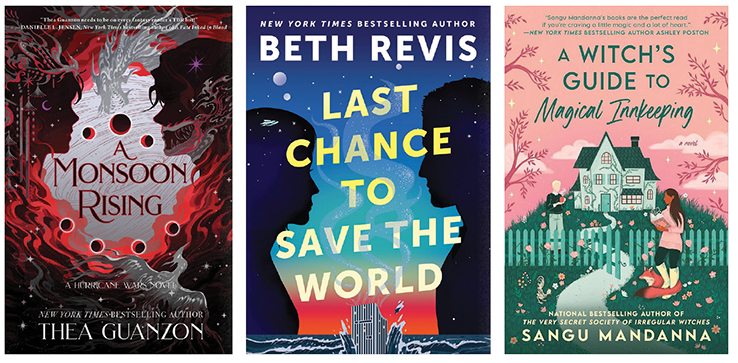Expanding Worlds | SF & Fantasy Trends and Titles To Know
This year’s investigation into the realms and labs of fantasy and science fiction reveals a genre with pure magnetic attraction, while genre blends—from romantasy to SF mystery to SFF horror—redefine what’s possible and rocket toward their day in the sun.
This year’s investigation into the realms and labs of fantasy and science fiction reveals a genre with pure magnetic attraction. So fertile are the two genres that there do not seem to be enough portmanteaus to contain all the possible variations. The mix of romance and fantasy that changed the landscape of both those genres continues to build from success to success, even branching out into new subgenres. Not to be left behind, SF is now also mixing with romance—and is blending with mystery too. Fantasy and SF are also both melding with horror, while fantasy cozies have moved into their own cottage in the genre and put the kettle on. In this guide to the trends of the forthcoming season, we count the mixes and highlight titles not to miss. A downloadable list of all titles mentioned can be found here.

Romantasy
Romantasy continues to reign as the key influence in the publishing landscape. Brendan Deneen, director of media, TV, and film at Blackstone Publishing, says, “It’s hard to argue that romantasy isn’t the fastest-growing thing in the genre right now—I’m even hearing non-industry people mention it in casual conversation. The last time I heard a genre catchphrase like this catch on so fast was new adult.” Daniel Ehrenhaft, senior acquisitions editor at Blackstone, noted that he is seeing “much more romantasy than in the past, especially in LGBTQ+ settings/worlds.”
In 2024, and definitely continuing into 2025, romantasy is spreading beyond the dragon wings of Rebecca Yarros’s “Empyrean” series to include cozy, contemporary, historical, angsty, sweet, and sexy elements of romance. It’s also broadening its reach from a foothold in epic fantasy settings to expand into all of the settings, worlds, and tropes that fantasy itself occupies, from the mythology and history retellings of Lauren J.A. Bear’s Mother of Rome (Ace: Berkley), a fantasy feminist version of the founding of Rome, to Hugo winner Emily Tesh’s sapphic romantasy The Incandescent (Tor). The political life-and-death stakes that fuel many fantasy works are ably represented in Six Wild Crowns (Orbit) by Holly Race, set in a fantasy version of the court of Henry VIII with added magic and dragons. The shadows of romantasy are also explored in The Serpent and the Wolf (Saga/S. & S.) by Rebecca Robinson and The Knight and the Moth (Orbit) by Rachel Gillig, showing that the gothic is very much a part of the new romantasy explosion, while on the less gritty side of romantasy, Stephanie Burgis’s series opener Wooing the Witch Queen (Bramble) explores a gas-lamp setting.
The Monsters (and Magical Cats) Are Coming
Building on romantasy and developing into a trend that encompasses both fantasy and SF, monster romantasy is striding over the horizon, per Berkley and Ace publicist Stephanie Felty, with books such as Bull Moon Rising (Ace: Berkley) by Ruby Dixon, Under Loch and Key (Berkley) by Lana Ferguson, and Kimberly Lemming’s SF series starter I Got Abducted by Aliens and Now I’m Trapped in a Rom-Com (Berkley) leading the pack. Adding to the surge will be Hache Pueyo’s gothic sapphic monster romance But Not Too Bold (Tor.com).
Sarah Guan, publisher at Erewhon Books, also notes an expansion of the trend: “Creature fantasy for adults—fantasy novels where humans have familiar-like or other forms of relationships with magical creatures such as dragons, unicorns, talking cats, etc.—is on the rise. This is distinct from shifter books (where humans become creatures), which have perennially been on everyone’s radar.” This category includes monster romance but broadens the idea to cozy fantasies as well, including two debuts—Mariana Costa’s Shoestring Theory (Angry Robot) and You Yeong-Gwang’s The Rainfall Market (Ace: Berkley; tr. from Korean by Slin Jung), both of which involve magical felines.
Sci-Ro?
Just as romantasy has blurred the line between fantasy and romance, science fiction has begun to push against its boundary with romance, although this genre blend might need to develop its own catchy name to reach the same level of popularity. “Ro-fi? Sci-ro? I don’t know what it will be called, but I think it will grow,” says Blackstone’s Deneen. Tor Books, through the Bramble imprint, has been exploring the sci-fi romance trend with titles including Chaos by Constance Fay, the third book in her popular “Uncharted Hearts” series, while DAW is adding a touch of romance to its SF titles with the third book in Beth Revis’s “Chaotic Orbits” series, Last Chance To Save the World.

SFF/Horror
Another trend to note is the narrowing of the gap between horror and other types of speculative fiction, leading to an increase in gothic fantasy and romance, dark fantasy, and sci-fi horror. Both Gemma Creffield, senior commissioning editor at Angry Robot, and Lara Baez, senior manager of marketing and publicity at HarperCollins, tell LJ that they are nominating horromantasy (horror + fantasy + romance) as an up-and-coming trend; Creffield also mentions romantastopia (romance + fantasy + dystopia). Fantasy has always crept into horror via dark and gothic works—note The Manor of Dreams (Avid Reader: S. & S.) by Christina Li and A Palace Near the Wind (Titan) by Ai Jiang—but this year’s Eat the Ones You Love (Tor) by Sarah Maria Griffin puts a contemporary spin on fantasy horror, combining the real-life terrors of working retail with a predatory plant whose like hasn’t been seen since The Little Shop of Horrors, but this time it’s not played for laughs. Also look for The Vengeance (Solaris) by Emma Newman, a tale of swashbuckling vampires among Alexandre Dumas’s three musketeers.
Sci-fi horror has been growing too, as evidenced by S.A. Barnes’s latest, Cold Eternity (Tor Nightfire). Mira Grant (a.k.a. Seanan McGuire) tackles apocalyptic alien-invasion body horror in Overgrowth (Tor Nightfire), while The Glass Garden (Lanternfish) by Jessica Lévai travels with an archaeologist and her salvage crew to explore an ancient artifact that might be more than they bargained for, whether for good or terrible reasons. The science-lab side of sci-fi horror is chillingly represented in Michael Nayak’s debut novel, Symbiote (Angry Robot), set at a remote Antarctic base where war arrives in a tiny package of very hungry parasites. Supernatural horror, which creeps across the borders between science fiction, fantasy, and horror, is also part of this trend, as seen in Residue: Paramentals Rising (Wordfire) by John Harrison.
Sci-Fi Mystery
Still another genre blend gaining ground is sci-fi mystery. Building on the success of titles such as Aliette de Bodard’s Navigational Entanglements and Izzy Wasserstein’s These Fragile Graces, This Fugitive Heart, there are new sci-fi mystery blends to explore in the coming months. Tochi Onyebuchi’s Harmattan Season (Tor) represents a shift from his previous dystopias to an old-fashioned hard-boiled mystery in the vein of Raymond Chandler, set in postcolonial West Africa. A murder investigation, involving old scores and estranged siblings (two humans and one robot), lies at the heart of Silvia Park’s Luminous (S. & S.). Adam Oyebanji returns to SF with the near-future sci-fi mystery/thriller Esperance (DAW), while Dan Hanks’s The Way Up Is Death (Angry Robot) is a sci-fi thriller filled with mystery and humor. Olivia Waite, best known for her “Feminine Pursuits” historical romance series, brings her talents to cozy sci-fi mystery with Murder by Memory (Tor.com). And don’t miss The Potency of Ungovernable Impulses (Tor), the third in Malka Older’s cozy sapphic space-opera mystery series “The Investigations of Mossa and Pleiti.”
Magically Cozy Reads
Cozy fantasy has crossed over into magical realism, creating a whole new subgenre of warm and fuzzy stories whose blanket of comfort covers worlds that are just slightly skewed from our own—see TJ Klune’s Somewhere Beyond the Sea (Tor) and Sangu Mandanna’s A Witch’s Guide to Magical Innkeeping (Berkley)—as well as epic fantasy settings like those of trendsetter Rebecca Thorne. The latest entry in her “Tomes & Tea” series, Tea You at the Altar (Bramble), arrives in March. Still more titles to suggest to readers, covering a range of locales, include The Grimoire Grammar School Parent Teacher Association (Titan) by Caitlin Rozakis, which tells a tale about young monsters, old privilege, and parents trying to survive PTA meetings; Andrea Eames’s A Harvest of Hearts (Erewhon), a cozy fairy tale about true love, inner beauty, and a kingdom’s secrets; and Julie Leong’s debut The Teller of Small Fortunes (Ace: Berkley) which follows the fate of a wandering fortune teller and also includes a slightly magical cat.

More Books Not To Miss
Beyond these genre blends, there are even more titles to note. Rachel Howzell Hall turns from crime fiction to fantasy with The Last One (Entangled: Red Tower), a series launch about a young woman who awakens with missing memories and seeks answers as her magic grows. Terry Brooks also starts a new series with Galaphile (Del Rey), which returns to the world of Shannara for the origin story of the druid order and its creator. Readers can look forward to several sequels as well: The Ashfire King (Orbit) by Chelsea Abdullah, Tideborn (Orbit) by Eliza Chan, The Ragpicker King (Del Rey) by Cassandra Clare, A Monsoon Rising (Harper Voyager) by Thea Guanzon, One Way Witch (DAW) by Nnedi Okorafor, Lore of the Tides (Harper Voyager) by Analeigh Sbrana, A Crown So Silver (Orbit) by Lyra Selene, and Don’t Sleep with the Dead (Tor.com) by Nghi Vo, a companion novella to The Chosen and the Beautiful, her acclaimed reimagining of The Great Gatsby. Other awaited series entries include Melissa Blair’s An Honored Vow (Union Square & Co.), Heather Fawcett’s Emily Wilde’s Compendium of Lost Tales (Del Rey), Mary Robinette Kowal’s The Martian Contingency (Tor), Gregory Maguire’s Wicked prequel Elphie (Morrow), and Rebecca Yarros’s Onyx Storm (Entangled: Red Tower). There are also standout stand-alones: Olivie Blake’s Gifted & Talented (Tor), about three telepathically and electrokinetically gifted siblings vying for an inheritance; John Scalzi’s When the Moon Hits Your Eye (Tor), in which the moon has turned into cheese; Kell Woods’s Upon a Starlit Tide (Tor), a historical fantasy mash-up of “The Little Mermaid” and “Cinderella”; and Amal El-Mohtar’s solo novella debut, The River Has Roots (Tor.com), about two sisters who live in a town on the edge of Faerie.
Conclusion
Blending genres allows authors to mine the best elements of a range of fiction categories, expand the appeal factors, tropes, plots, and settings of their novels, and craft the perfect read for every kind of reader. Observers of speculative fiction have long noted the closing of the gaps between subgenres; how wonderful that this narrowing has resulted in something so spectacularly expansive—novels that invite readers in through multiple points of enchantment.
Marlene Harris, a 2024 recipient of the RUSA CODES Louis Shores Award for excellence in book reviewing, is an independent book reviewer at Reading Reality, as well as an SFF columnist for LJ, and was named an LJ Reviewer of the Year in 2018. She has served on several ALA book award committees and, before turning to writing, held positions in public and academic libraries.
Add Comment :-
ALREADY A SUBSCRIBER? LOG IN
We are currently offering this content for free. Sign up now to activate your personal profile, where you can save articles for future viewing








